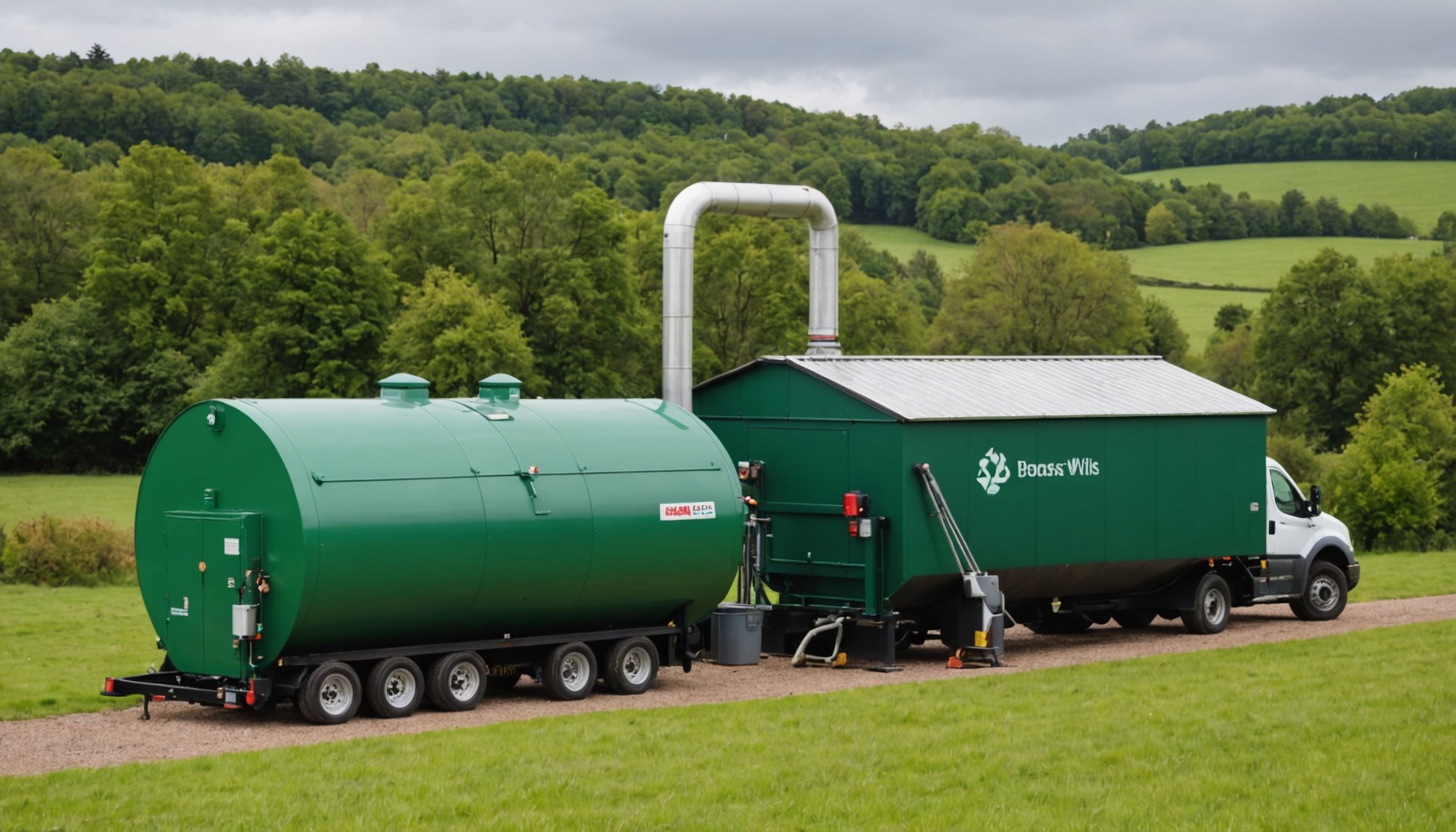Overview of Biomass Boilers in Rural UK Settings
In recent years, there has been growing interest in biomass boilers as a sustainable heating solution within rural UK settings. These systems utilize renewable energy sources such as wood pellets, chips, or logs to generate heat. By converting organic materials into thermal energy, biomass boilers provide an efficient alternative to traditional, fossil fuel-based heating systems. This makes them especially appealing for rural areas, where such options can be scarce and costly.
Biomass boilers offer multiple benefits in these regions. Firstly, they promote sustainability by utilizing natural and replenishable resources, reducing reliance on fossil fuels. In addition, they can lead to significant cost savings over time, as biomass fuel is often less expensive and price-stable compared to oil or gas.
A voir aussi : Maximize Energy Savings: Essential Tips for UK Homeowners to Perfectly Set Their Smart Thermostat
Furthermore, the increased adoption of these heating solutions in rural settings aligns with the UK’s broader environmental goals of reducing carbon emissions and promoting clean energy. Local availability of biomass resources can further ease logistical challenges, making these systems practical for countryside residences and community buildings. By investing in biomass boilers, rural communities can enjoy reliable, eco-friendly, and cost-effective heating, thus significantly enhancing their quality of life and contributing to a greener future.
Site Assessments and Installation Considerations
Before embarking on an installation journey, conducting a comprehensive site assessment is crucial. This step ensures that all installation requirements are met and potential issues are identified early on. Understanding the unique characteristics of your site, such as existing infrastructure and space constraints, plays a pivotal role in determining project feasibility.
En parallèle : Smart Strategies for Safely Managing and Disposing of Cooking Oil in Your UK Kitchen
Among the key factors influencing site suitability, accessibility stands out. It’s essential to ensure that the location can be easily reached by installation teams and equipment. Adequate space is another critical consideration; this includes not just room for installation activities but also storage and maintenance needs. Infrastructure considerations, like the availability of robust foundational support, power supply, and connectivity, are indispensable for the successful operation of installed systems.
In rural settings, installation challenges are often magnified by factors like limited access to power lines and restricted infrastructure. Addressing these issues involves innovative solutions such as off-grid power systems or enhancing existing infrastructure. Strategic planning and tailored solutions can significantly mitigate challenges, turning potential setbacks into manageable tasks. By prioritising thorough site assessments and addressing specific installation requirements upfront, installations can proceed with greater confidence and efficiency.
Understanding Regulations and Compliance
When considering the installation of a biomass boiler, understanding regulatory requirements and compliance standards is crucial. In the UK, various regulations govern the safe and efficient installation of biomass boilers to ensure they meet specific environmental regulations.
Firstly, emissions regulations are of high significance. These require biomass boilers to maintain certain pollutant levels to protect the environment and public health. It’s essential to check current standards to ensure compliance. Failure to comply could result in fines or required modifications to the installation.
Moreover, consulting local authorities is an important step before initiating the installation process. Local planning and environmental offices can provide detailed insights into specific compliance standards that may apply to your area. They can also guide on potential issues, such as proximity to residential areas, which might impact your project’s feasibility.
Considering environmental standards, the Clean Air Strategy outlines emission limits crucial for biomass boiler operation. Ensuring alignment with these standards not only aids in legal compliance but also promotes proper environmental stewardship.
For anyone planning a biomass boiler installation, understanding these regulatory requirements is essential for a smooth and legally compliant process.
Costs Associated with Biomass Boiler Installation
Understanding the financial implications of installing a biomass boiler is crucial for making an informed decision. The initial investment typically involves several components, including the cost of the boiler unit itself, delivery and installation fees, and any necessary system modifications to accommodate the new equipment. Installation costs can also fluctuate based on the size and complexity of the system required to meet your heating needs.
Once the system is up and running, ongoing operating expenses come into play. These include the cost of fuel, which varies depending on the type of biomass used, regular maintenance to ensure efficient operation, and any potential repair costs. The expense of maintaining a biomass boiler is generally higher than traditional heating systems, due to the need for specialised skills and parts.
Fortunately, there are often financial incentives or rebates aimed at reducing the burden of these costs, especially for rural installations. Such incentives can significantly reduce the initial investment, making biomass boilers a more viable option for many. Prospective buyers should research available programmes, such as government grants or tax credits, which can offset both installation costs and ongoing expenses.
Fuel Supply and Logistics in Rural Areas
In rural settings, fuel supply chains face unique challenges. Among the various types of biomass fuel available, wood, agricultural residues, and animal waste prove particularly relevant. These fuels are often abundant locally, making them cost-effective. However, delivery logistics can be complex, especially in remote areas lacking infrastructure.
Sourcing and delivering biomass fuel involve several logistical hurdles. Uneven road conditions and limited access to transportation can impede supply chains. Additionally, weather conditions can further complicate delivery, affecting timeliness and availability. Establishing reliable supply chains requires overcoming these obstacles through strategic planning and innovative solutions.
Developing robust biomass sourcing strategies is essential. Localising the gathering of biomass materials can minimise transportation needs, reducing costs and enhancing supply predictability. Engaging nearby communities in biomass sourcing activities not only aids logistics but also encourages economic opportunities within the locality.
To bolster reliability in the fuel supply chain, partnerships with local entities are beneficial. Collaboration with local farmers and community organisations can streamline fuel procurement and ensure a stable supply. Such alliances foster mutual support and shared benefits, forming a resilient network capable of withstanding logistical challenges in rural areas.
Maintenance Requirements and Best Practices
Regular upkeep of biomass boilers is essential for their smooth operation and longevity. Routine maintenance tasks, such as cleaning the heat exchanger, inspecting seals, and checking feed systems, ensure the equipment operates at peak efficiency. Regular checks of these components help in preventing potential failures that could lead to costly repairs and downtime.
To extend the lifespan of a biomass boiler, consider implementing some recommended practices. Ensure the storage of biomass fuel is dry and compact to prevent moisture-related efficiency drops. A consistent schedule for ash removal is necessary to maintain optimal combustion and prevent blockages. Additionally, inspecting controls and safety devices regularly ensures operational safety and efficiency.
Efficiency can also be maximised by addressing operational issues promptly. Calibrate the system sensors and automation mechanisms to match the manufacturer’s specifications. Correct airflow settings ensure the boiler burns biomass completely, reducing waste and emissions. Routine servicing by a qualified technician, ideally annually, helps in identifying any inefficiencies or potential mechanical issues early.
Adhering to these maintenance practices not only enhances boiler performance but also supports sustainable energy usage, maintaining a balance between energy efficiency and environmental care. Such diligence can lead to extended equipment lifespan and reduced operational costs over time.
Comparison with Alternative Heating Solutions
In rural settings, selecting the right heating solution is crucial for both efficiency and sustainability. Alternative heating systems such as oil, gas, and electric are common choices. However, understanding their performance in terms of cost and efficiency reveals significant insights.
Oil and Gas Heating
Oil and gas are traditional choices, often known for their reliable heat output. However, they require access to a steady supply which can be challenging in remote locations. Their efficiency comparison with biomass shows that while they heat rapidly, they are less sustainable. Gas and oil emit more pollutants, impacting air quality negatively.
Electric Heating
Electric systems are convenient and clean at the point of use but are less cost-effective long-term. Their efficiency is hampered by high electricity prices, especially in areas with unstable power grids.
Biomass Heating
Biomass stands out when considering cost analysis and sustainability. It offers a renewable solution with lower long-term expenses, particularly beneficial in areas with access to local resources. For those in rural contexts, biomass can provide a more efficient, economical, and eco-friendly alternative compared to traditional methods.
Selecting the right system involves considering these factors in light of specific rural needs and contexts.
Case Studies and Testimonials
Exploring real-life examples can provide insight into the benefits of biomass boiler installations, particularly in rural UK settings. One success story involves a small farming community that dramatically reduced heating costs by switching to biomass boilers. By utilizing local wood chips as a fuel source, residents noted a significant decline in their annual fuel expenses.
User experiences reflect widespread satisfaction with these systems. Many report not just energy efficiency improvements, but also a reduction in carbon footprints. A rural school, for instance, embraced biomass boilers and achieved enhanced heating reliability while simultaneously teaching students about sustainable practices. These successful biomass boiler installations exemplify tangible benefits.
Testimonials also highlight the personal impact. One user shared their story of experiencing immediate financial relief due to the predictable and reduced cost of biomass pellets, which helped in budgeting more effectively for other needs. Another user commended the maintenance ease, citing minimal technical issues and long-lasting equipment durability.
These success stories and user experiences underline the potential for both economic and environmental benefits. They emphasize the value of considering biomass boilers as a cost-saving and sustainable heating option for rural communities.
Resources and Funding Options
When considering the installation of a biomass boiler, funding opportunities can significantly ease the financial burden. One of the foremost resources is the variety of grants available specifically for biomass projects. These grants offer substantial financial assistance, particularly in the UK, where several programs aim to support eco-friendly energy solutions. Noteworthy among these is the Renewable Heat Incentive, a government-backed scheme providing ongoing payments for the energy you generate through sustainable means.
Navigating the maze of funding opportunities can be daunting, but understanding the process is crucial. Start by thoroughly reviewing eligibility criteria for relevant grants and subsidies to identify the best financial assistance available. Many local councils and environmental agencies offer support, which can be accessed through their websites or by contacting them directly for guidance.
Applying for these funding schemes typically involves a detailed proposal or application process. It’s essential to gather all necessary documentation and provide clear information about the projected environmental benefits and cost-effectiveness of the biomass boiler. Persistence and attention to detail during the application process can enhance the likelihood of securing the necessary financial assistance. Capitalising on available resources ultimately facilitates a smoother transition to sustainable energy.











